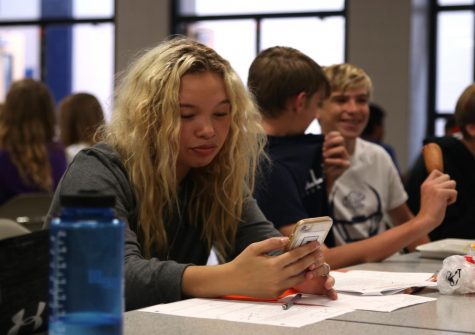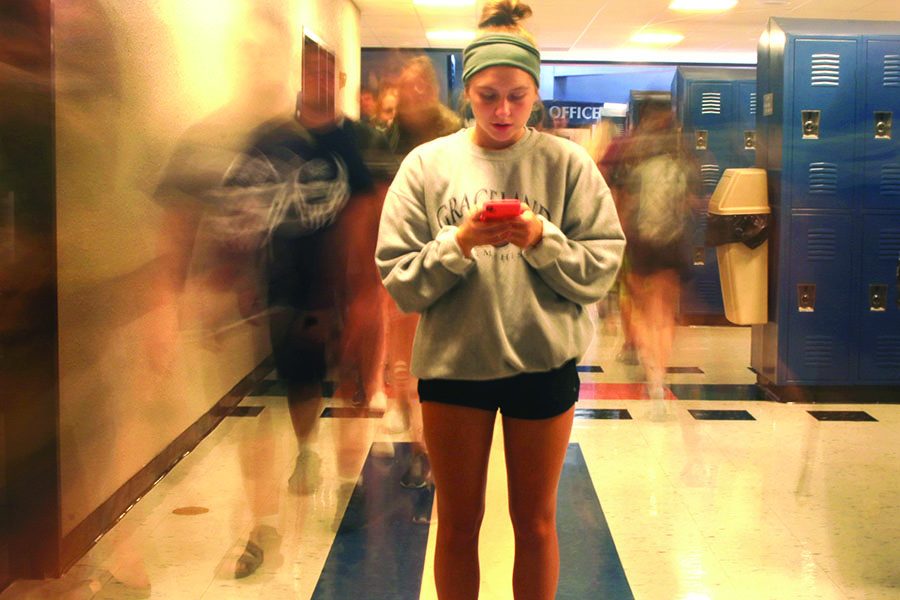Controversial new cell phone policy prohibits students from using phones during class
The district-wide policy bans all cell phones from bell to bell
The new cell phone policy makes students use their phones in the hallways between classes or during lunch.
September 23, 2019
The district implemented controversial new restrictions on cell phone use during school this year. The new district-wide restrictions prohibit students from having cell phones out at any time while class is in session — or, as many students have heard it called, bell to bell. Students are still allowed to use cell phones during passing periods and lunch.
The decision to ban cell phones from classrooms was made by the district’s secondary principals, including Tobie Waldeck. They believed that with every student receiving a MacBook, cell phones as learning devices in the classroom would become redundant, according to assistant superintendent Alvie Cater.
“The previous Bring Your Own Device program was put into place in an effort to have more devices in the classroom to support learning … our schools simply did not have enough laptops,” Cater said. “Now that [every student has a device], we believe a limit on the use of mobile phones by students is more than appropriate.”
For some teachers, like English teacher Ashley Agre, who was a pioneer of cell phone restrictions, the policy doesn’t require much of an adjustment. In 2017, while most teachers still allowed students to keep their phones in their pockets during class in accordance with the Bring Your Own Device program, Agre decided to introduce the phone home and require kids to take a break from their devices. Putting aside personal devices gave Agre peace of mind.
“I [stopped allowing phones] because I knew they were a distraction,” Agre said. “[Keeping phones out of class allows] me to not have to manage them and make sure that people weren’t secretly texting.”
Math teacher Laurie Deuschle, recognized for her strict cell phone policies, celebrated when she received news about the school’s new bell to bell policy. She doesn’t think there’s a good reason for cell phones in her classroom.
“If there was a time and a place for [using a phone in class], I’d be okay with it. I just don’t know when that time and place is right now,” Deuschle said.

The new cell phone policy has support from physics teacher Ryan Johnston as well, who observed the very negative effect cell phones had on his students.
“I saw what [phone use] was doing to my students’ attention spans and quality of attention. They weren’t really there, even when they were [not on their phones],” Johnston said.
While numerous teachers support the new cell phone policy, many students critique its restriction of their freedom to use their phones. Junior Michael Brown, however, sees both sides of the issue.
“I think [the policy] hurts kids on some level, but it is beneficial in keeping their attention at some points during the school day,” Brown said.
Sophomore Patrick Mack is, like some of the student body, a bit more critical of the policy.
“I do not think the policy has improved my learning capabilities at all,” Mack said. “Overall, the phone ban has harmed students because of the opportunities it takes away and the amount of detentions people will get from just doing things as simple as trying to see the time.”
Agre agrees with Mack that there are times during her class where a lack of cell phones takes away opportunities, like when she is attempting to play Kahoot or Quizlet Live. However, in all other cases she still dislikes the idea of phones in class.
“The only time I would really like for [students] to be able to have [phones] is when we are playing games like Kahoot,” Agre said. “I can see the positives and the negatives.”
Brown takes the most moderate position: he believes the policy can be amended to be slightly more lenient while also maintaining its positive effect on the classroom.
“I would make a policy where you would keep your phone in a cubby until the end of the lesson, but not require phones to be banned bell to bell,” Brown said. “I would also allow people to use their phones during seminar.”











